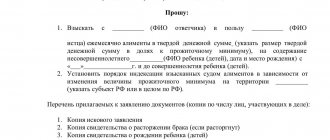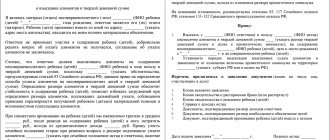Article 83 of the RF IC. Collection of alimony for minor children in a fixed amount
1. In the absence of an agreement between the parents on the payment of alimony for minor children and in cases where the parent obligated to pay alimony has irregular, variable earnings and (or) other income, or if this parent receives earnings and (or) other income in whole or in part in kind or in foreign currency, or if he has no earnings and (or) other income, as well as in other cases, if the collection of alimony in proportion to the earnings and (or) other income of the parent is impossible, difficult or significantly violates the interests of one of the parents. parties, the court has the right to determine the amount of alimony collected monthly, in a fixed sum of money or simultaneously in shares (in accordance with Article 81 of this Code) and in a fixed sum of money.
2. The amount of a fixed sum of money is determined by the court based on the maximum possible preservation of the child’s previous level of support, taking into account the financial and marital status of the parties and other noteworthy circumstances.
3. If there are children with each of the parents, the amount of alimony from one of the parents in favor of the other, less wealthy one, is determined in a fixed amount of money, collected monthly and determined by the court in accordance with paragraph 2 of this article.
Return to the table of contents of the document: Family Code of the Russian Federation in the current edition
Comments on Article 83 of the RF IC, judicial practice of application
Explanations of the Plenum of the Supreme Court of the Russian Federation 2021:
The Resolution of the Plenum of the Supreme Court of the Russian Federation dated December 26, 2017 N 56 “On the application of legislation by courts when considering cases related to the collection of alimony” contains the following explanations:
Child support in a fixed amount cannot be collected on the basis of a court order
Requirements for the collection of alimony, within the jurisdiction of the magistrate, are resolved by the magistrate in the order of writ proceedings (Chapter 11 of the Code of Civil Procedure of the Russian Federation) or in the manner of claim proceedings (Chapter 12 of the Code of Civil Procedure of the Russian Federation).
In accordance with paragraph five of Article 122 of the Code of Civil Procedure of the Russian Federation, a judge has the right to issue a court order if a demand is made for the collection of alimony for minor children, not related to establishing paternity, challenging paternity (maternity) or the need to involve other interested parties. On the basis of a court order, alimony for minor children cannot be collected in a fixed amount of money, since resolving this issue involves the need to verify the presence or absence of circumstances with which the law connects the possibility of such collection (Article 83, paragraph 4 of Article 143 of the RF IC).
In the event of filing an application for a court order for alimony claims that are not subject to resolution in the order of writ proceedings (for example, the debtor pays alimony by court decision to other persons; a claim is made for the collection of alimony in a fixed sum of money or simultaneously in shares and in a fixed monetary amount amount; along with the demand for the collection of alimony in proportion to the earnings and (or) other income of the parents, a demand was made for the recovery of alimony on the basis of the second paragraph of paragraph 2 of Article 107 of the RF IC for the time preceding the filing of the specified application), the judge refuses to accept the application for issuing a court order under paragraph 3 of part 3 of article 125 of the Code of Civil Procedure of the Russian Federation.
(See paragraph 3 of the Resolution for more details)
Circumstances taken into account when establishing the amount of alimony
Resolving issues of establishing the amount of alimony to be collected in a fixed sum of money (Articles 83, , , , 98 of the RF IC), ... as well as other issues that, in accordance with the norms of Section V of the RF IC, are subject to resolution by the court, taking into account the financial and marital status of the parties and other relevant circumstances or interests of the parties, it is necessary to proceed from the following:
- When determining the financial situation of the parties, all types of their income should be taken into account (salaries, income from business activities, from the use of the results of intellectual activity, pensions, benefits, payments for compensation for harm to health and other payments), as well as any property belonging to them (including including securities, shares, deposits made in credit organizations, shares in the authorized capital of a limited liability company);
- when establishing the marital status of the alimony payer, it is necessary, in particular, to find out whether he has other minor or disabled adult children or other persons whom he is obliged by law to support;
- other circumstances worthy of attention are, for example, the incapacity of the alimony payer, the restoration of the alimony recipient's ability to work.
(See paragraph 8 of the Resolution for more details)
Alimony can be collected as a share of earnings or as a fixed amount.
The requirement to collect alimony for a minor child is subject to satisfaction by the court, regardless of the parents’ ability to work, as well as the child’s need for alimony.
Alimony for minor children is collected in proportion to the earnings and (or) other income of the parents (Article 81 of the RF IC) or can be collected in a fixed sum of money or simultaneously in shares and in a fixed sum in cases provided for in Article 83 of the RF IC.
(See paragraph 18 of the Resolution for more details)
Child support can be collected in a fixed sum of money or simultaneously in shares and in a fixed sum of money.
If a claim for the collection of alimony for a minor child is made against both parents of the child, the court determines the amount of alimony to be collected from each parent.
The amount of alimony collected from each parent in proportion to the earnings and (or) other income of the parent is determined by the court according to the general rules established by Article 81 of the RF IC, that is, depending on the number of children for whose maintenance the payment is made from this parent.
If there are circumstances provided for in paragraph 1 of Article 83 of the RF IC, alimony from both parents or from one of them can be recovered in a fixed sum of money or simultaneously in shares and in a fixed sum of money.
(See paragraph 21 of the Resolution for more details)
A high level of income for an alimony payer is not yet a basis for collecting alimony in a fixed sum of money, and not as a share of earnings
A high level of income for a parent obligated to pay alimony does not in itself relate to the circumstances established by Article 83 of the RF IC, under which it is possible to collect alimony in a fixed sum of money, and not as a share of earnings. At the same time, if the court finds that the collection of alimony in proportion to the earnings and (or) other income of the parent significantly violates the interests of one of the parties, alimony may be collected in a fixed amount.
By virtue of the provisions of Article 56 of the Code of Civil Procedure of the Russian Federation, the burden of proving circumstances related to the possibility of collecting alimony for a minor child in a fixed sum of money in connection with a violation of the interests of the alimony payer is placed on the person obligated to pay alimony.
(See paragraph 23 of the Resolution for more details)
Alimony in a fixed amount can be collected even if the parent has a permanent job and regular income
The fact that a parent has a permanent job and regular income cannot serve as an unconditional basis for refusing to satisfy the request to collect from such a person alimony for a minor child in a fixed sum of money or simultaneously in shares and in a fixed sum of money, if the court determines that the collection of alimony in share of the parent’s earnings and (or) other income does not allow the child to maintain the same level of support for him, and the collection of alimony in a fixed sum of money or both in shares and in a fixed sum of money will be most in the interests of the child and not violate the rights of the specified parent (for example , in the case where the parent hides his actual income and has other income, from which, by virtue of Article 82 of the RF IC, alimony could be withheld).
(See paragraph 24 of the Resolution for more details)
When there are no grounds for collecting alimony in a fixed amount...
If a demand is made for the collection of alimony in a fixed sum of money, but the court finds that the grounds provided for by law (clause 1 of Article 83 of the RF IC), in the presence of which it is possible to collect alimony in a fixed sum of money or simultaneously in shares and in a fixed sum of money, are not available, the court puts for discussion between the parties the issue of collecting alimony in proportion to the earnings and (or) other income of the parents and, based on the priority protection of the rights and interests of the child (Article 3 of the Convention on the Rights of the Child, paragraph 3 of Article 1 of the RF IC), issues decision to collect alimony in the amount determined by paragraph 1 of Article 81 of the RF IC.
(See paragraph 26 of the Resolution for more details)
Establishment by the court of alimony in the amount of less than half of the corresponding subsistence level for children
By virtue of paragraph 2 of Article 83 of the RF IC, the amount of alimony recovered in a fixed amount for minor children from parents, as well as from former adoptive parents when the adoption is canceled (clause 4 of Article 143 of the RF IC), is determined by the court based on the maximum possible preservation of the child’s previous level of his security, taking into account the financial and family status of the parties and other noteworthy circumstances.
It should be borne in mind that, taking into account the provisions of Articles 1 - 3 of the Federal Law of October 24, 1997 N 134-FZ “On the Living Wage in the Russian Federation”, as well as the equal obligation of parents to support their minor children, the establishment by the court of alimony subject to recovery from one of the child’s parents in the amount of less than half the corresponding subsistence minimum for children may occur in the case where the financial and (or) marital status of the alimony payer or other noteworthy circumstances objectively do not allow the recovery of alimony from him in the amount of half the corresponding living wage for children.
(See paragraph 27 of the Resolution for more details)
Collection procedure
Such claims, as well as those for the recovery of maintenance in the statutory share of the parent’s earnings, are subject to consideration by magistrate courts, or federal district courts, if the claims are presented along with other demands. For example, about the division of property of spouses or determining the place of residence of common children.
Claim under Art. 83 of the RF IC is filed at the place of residence of the parent from whom maintenance is being recovered, or at the location of his property.
Recommended publications on logos-pravo.ru
Collection of alimony for minor children in a fixed amount
Child support from salary and in the absence of income
Not enough alimony? Is it possible in a fixed amount of money?
Collection of alimony in a fixed amount. Arbitrage practice
Little alimony from a small salary!
Sample statement of claim for alimony collection
All possible options for claims in the section “ statements of claim for the recovery of alimony ”
What matters to the court when making a decision?
What amount will be determined by the court for monthly payment depends on each specific case. Of no small importance is what arguments the defendant himself will present in his defense. For example, some negligent parents, pursuing the goal of reducing the amount of alimony, may provide the court with certificates showing an underestimated income, judicial practice under Art. 83 The RF IC knows many similar cases. In the absence of other evidence from the plaintiff, the official resolving the case will have to rely on the available evidence.
Therefore, it is extremely important to prove that the defendant has all types of income, including those that are not officially registered, as well as the circumstances under Part 2 of Art. 83 RF IC.
In addition, when determining the amount, the judge will take into account the fact that the defendant at the time of going to court may already have another family and children born from another marriage. In this case, you should not count on a maintenance amount significantly exceeding the amount of alimony payments established by law.
Defendant's rights
In some cases, the payer may stop transferring money. But as judicial practice shows, such situations are not frequent.
The defendant has the right to terminate the provision of alimony provided that:
- the child has either reached adulthood or acquired the status of a capable citizen before reaching adulthood;
- the minor is not the official heir of the defendant (adopted).
The reason for termination of child support may also be the death of the child or the defendant.
The procedure for filing a claim for alimony in a fixed amount
The initiator of the assignment of payments must file a claim with the Magistrates' Court. The applicant provides all documentation in two copies: one copy is intended for the magistrate, and the second for the defendant.
After the documents have been studied and verified by representatives of the court, both parties must appear at a preliminary hearing.
During the preliminary hearing, the judge may require the parties to provide originals of certain documents, and will also ask questions regarding the applicant's claims and the defendant's objections.
Having prepared the case for consideration, the judge will set a date for the main hearing and notify both parents.








